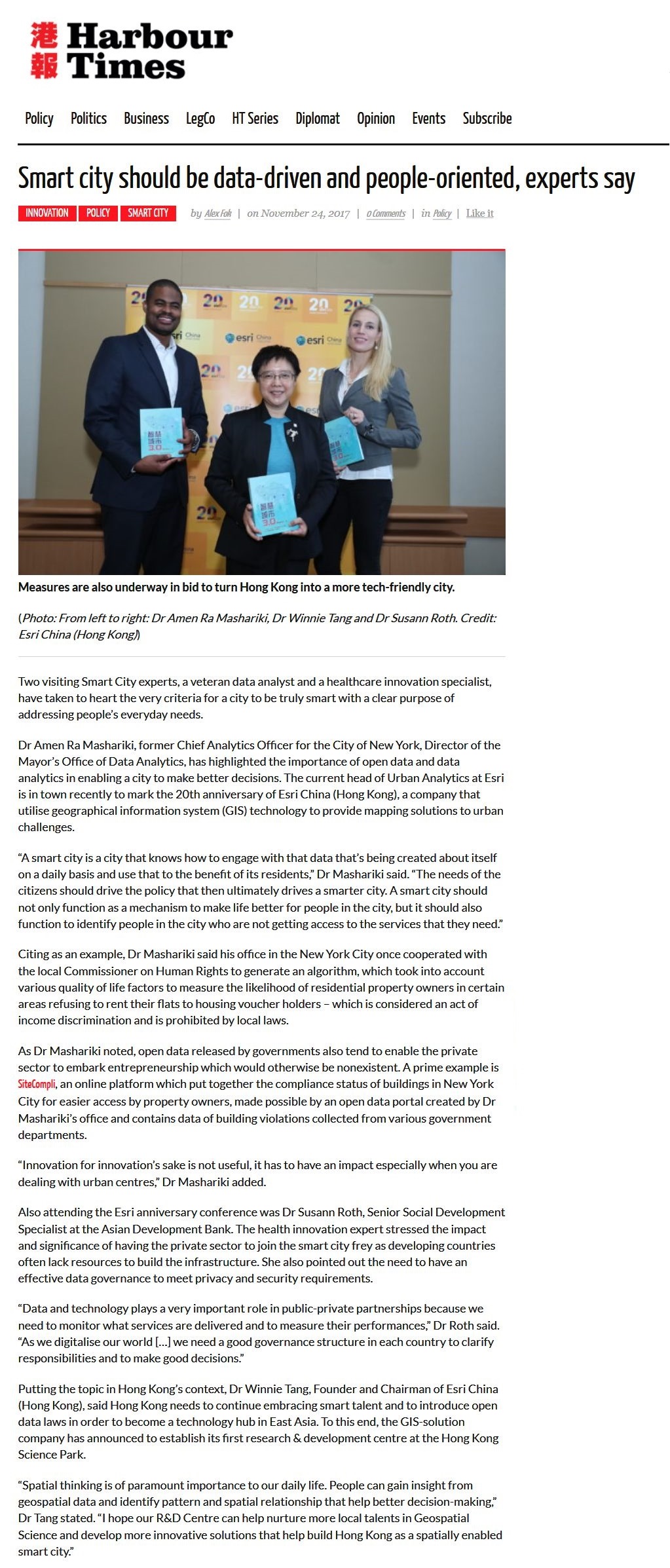網上版請按此

Smart city should be data-driven and people-oriented, experts say
Two visiting Smart City experts, a veteran data analyst and a healthcare innovation specialist, have taken to heart the very criteria for a city to be truly smart with a clear purpose of addressing people's everyday needs.
Dr Amen Ra Mashariki, former Chief Analytics Officer for the City of New York, Director of the Mayor's Office of Data Analytics, has highlighted the importance of open data and data analytics in enabling a city to make better decisions. The current head of Urban Analytics at Esri is in town recently to mark the 20th anniversary of Esri China (Hong Kong), a company that utilise geographical information system (GIS) technology to provide mapping solutions to urban challenges.
"A smart city is a city that knows how to engage with that data that's being created about itself on a daily basis and use that to the benefit of its residents," Dr Mashariki said. "The needs of the citizens should drive the policy that then ultimately drives a smarter city. A smart city should not only function as a mechanism to make life better for people in the city, but it should also function to identify people in the city who are not getting access to the services that they need."
Citing as an example, Dr Mashariki said his office in the New York City once cooperated with the local Commissioner on Human Rights to generate an algorithm, which took into account various quality of life factors to measure the likelihood of residential property owners in certain areas refusing to rent their flats to housing voucher holders – which is considered an act of income discrimination and is prohibited by local laws.
As Dr Mashariki noted, open data released by governments also tend to enable the private sector to embark entrepreneurship which would otherwise be nonexistent. A prime example is SiteCompli, an online platform which put together the compliance status of buildings in New York City for easier access by property owners, made possible by an open data portal created by Dr Mashariki's office and contains data of building violations collected from various government departments.
"Innovation for innovation's sake is not useful, it has to have an impact especially when you are dealing with urban centres," Dr Mashariki added.
Also attending the Esri anniversary conference was Dr Susann Roth, Senior Social Development Specialist at the Asian Development Bank. The health innovation expert stressed the impact and significance of having the private sector to join the smart city frey as developing countries often lack resources to build the infrastructure. She also pointed out the need to have an effective data governance to meet privacy and security requirements.
"Data and technology plays a very important role in public-private partnerships because we need to monitor what services are delivered and to measure their performances," Dr Roth said. "As we digitalise our world, we need a good governance structure in each country to clarify responsibilities and to make good decisions."
Putting the topic in Hong Kong's context, Dr Winnie Tang, Founder and Chairman of Esri China (Hong Kong), said Hong Kong needs to continue embracing smart talent and to introduce open data laws in order to become a technology hub in East Asia. To this end, the GIS-solution company has announced to establish its first research & development centre at the Hong Kong Science Park.
"Spatial thinking is of paramount importance to our daily life. People can gain insight from geospatial data and identify pattern and spatial relationship that help better decision-making," Dr Tang stated. "I hope our R&D Centre can help nurture more local talents in Geospatial Science and develop more innovative solutions that help build Hong Kong as a spatially enabled smart city."